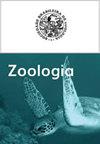寄生虫和捕食者对痛觉的影响:根田鼠(啮齿目:蟋蟀科)痛觉减少,越冬存活率降低
IF 1.8
4区 生物学
Q4 ZOOLOGY
引用次数: 1
摘要
越来越多的证据表明,被寄生虫感染的猎物更容易被捕食。然而,这种现象背后的机制尚不清楚。在小型哺乳动物中,环境应激源引起的镇痛是防御功能的基本组成部分,促进防御反应。因此,镇痛的减少可能会损害猎物的防御能力,增加它们的捕食风险。本研究旨在确定球虫感染是否会通过减少镇痛来增加根田鼠(Microtus oeconomus, Pallas, 1776)对捕食的脆弱性。本研究通过双水平析因实验模拟了捕食者刺激和寄生虫感染对小鼠的影响,评估了小鼠对厌恶性热刺激的伤害性反应。此外,通过重复诱捕,对具有不同伤害反应的田鼠越冬存活率进行了野外实验。球虫感染的田鼠在暴露于捕食者气味后表现出捕食者诱导的镇痛减少。与此同时,在整个实验期间,在封闭种群中,疼痛敏感田鼠的越冬存活率低于疼痛抑制田鼠。我们的研究结果表明,球虫感染减弱了捕食者引起的镇痛,导致对捕食者的脆弱性增加。本文章由计算机程序翻译,如有差异,请以英文原文为准。
Effects of parasites and predators on nociception: decreases analgesia reduces overwinter survival in root voles (Rodentia: Cricetidae)
Growing evidence suggests that parasite-infected prey is more vulnerable to predation. However, the mechanism underlying this phenomenon is obscure. In small mammals, analgesia induced by environmental stressors is a fundamental component of the defensive repertoire, promoting defensive responses. Thus, the reduced analgesia may impair the defensive ability of prey and increase their predation risk. This study aimed to determine whether coccidia infection increases the vulnerability to predation in root voles, Microtus oeconomus (Pallas, 1776), by decreased analgesia. Herein, a predator stimulus and parasitic infection were simulated in the laboratory via a two-level factorial experiment, then, the vole nociceptive responses to an aversive thermal stimulus were evaluated. Further, a field experiment was performed to determine the overwinter survival of voles with different nociceptive responses via repeated live trapping. The coccidia-infected voles demonstrated reduced predator-induced analgesia following exposure to predator odor. Meanwhile, pain-sensitive voles had lower overwinter survival than pain-inhibited voles in enclosed populations throughout the duration of the experiment. Our findings suggest that coccidia infection attenuates predator-induced analgesia, resulting in an increased vulnerability to predation.
求助全文
通过发布文献求助,成功后即可免费获取论文全文。
去求助
来源期刊

Zoologia
生物-动物学
自引率
0.00%
发文量
15
期刊介绍:
Zoologia, the scientific journal of the Sociedade Brasileira de Zoologia (SBZ), is an international peer-reviewed, open-access Zoological journal that publishes original research on systematics, evolution, taxonomy, nomenclature, biogeography, morphology, physiology, biology, ecology, symbiosis, conservation, behavior, genetics and allied fields. The journal, formerly known as Revista Brasileira de Zoologia, publishes original articles authored by both members and non-members of the Society. The manuscripts should be written exclusively in English.
 求助内容:
求助内容: 应助结果提醒方式:
应助结果提醒方式:


